- Suntory Beverage & Food
- > News Release
- > Suntory Health & Beverage Report 2017
News Release
- No.SBF0588(2017/10/3)
-

Suntory Health & Beverage Report 2017
― FOSHU beverages consumed by half of males in their 20s and 30s, popularity growing among younger generations.
Consuming FOSHU beverages as a healthy habit booster is prompting consumers to exercising and other healthy habits. Workers also adopting the practice of "morning FOSHU". ―
Suntory Beverage & Food Limited (SBF) has conducted a consumer trends survey on canned or bottled non-alcoholic drinks classified as “Foods for Specified Health Use” (FOSHU beverages) since 2014. This year’s report shows a comparison with results from past surveys and discusses the current state and possibilities of FOSHU beverages and functional foods as they relate to resolving the health issues facing Japan.
In light of growing consumer interest that extends beyond to FOSHU beverages to include functional foods and other health beverages, as of this edition we have changed the report name from the FOSHU Beverage Report to the Health & Beverage Report.
I. FOSHU Beverage Market Trends
New options increasing continuously for FOSHU beverages
II. Summary of consumer awareness survey on health and beverages
III. Consumer awareness survey on health and beverages
(1) Modern consumers facing a health dilemma
(2) FOSHU beverages functioning as a healthy habit booster
(3) FOSHU beverages growing in popularity among younger generations in their 20s and 30s. Consumed by half of males in their 20s and 30s
(4) Morning FOSHU functioning as health maintenance beverage for workers
IV. Conclusion
[Reference information] (1) Expected benefits of functional foods
[Reference information] (2) Symptoms that create worry about the future
I. FOSHU Beverage Market Trends
New options increasing continuously for FOSHU beverages
| Growing variety of available FOSHU beverages is stimulating the market |
Foods for specified health use (FOSHU foods/beverages) are designated and labeled based on authorization in accordance with Article 26 Paragraph 1 of Japan’s Health Promotion Act* or approval in accordance with Article 29 Paragraph 1 of the same law. The designation indicates to those consuming the food or beverage as part of their diet that they can expect to enjoy the specific health maintenance claim on the labeling.
Market for main FOSHU beverages (excluding those with intestinal health claims) was approx. 144 billion yen in 2016, which represents a minor growth trend for recent years. Recent trends have included the development and release of numerous new beverages, including a caffeine-free, sugar-free tea, coffee, and cola and other carbonated beverages as product options grow more diverse. The largest share is still held by sugar-free tea beverages but other types of FOSHU beverages are gradually increasing their market share, which reached 22.1% in 2016.
* The Health Promotion Act was enacted and promulgated in 2002, to address the needs of an aging population and changes in population disease structure. Its purpose is to promote the health of the people in Japan and prevent disease.
FOSHU foods and beverages are labeled to express potential health claims consumers can expect from consuming these products. However, these products must first undergo government screening and then be approved by the director general of the Consumer Affairs Agency (CAA).
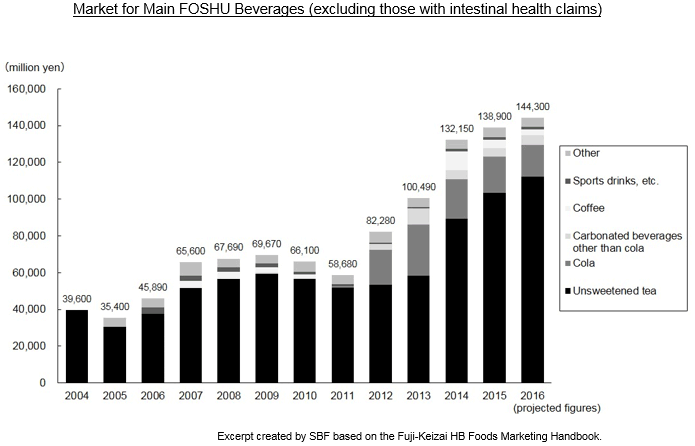 |
II. Summary of consumer awareness survey on health and beverages
(1) Modern consumers facing a health dilemma
■With nearly 80% of people wanting to practice healthy habits, modern Japanese people have a strong desire for health maintenance. On the other hand, as some 60% have not formed healthy habits and many Japanese people face a health dilemma in which though they desire to exercise but are not doing so.
■With busy working people in particular, we are seeing an increase in people facing health dilemmas related food, health, and sleep due to a lack of time.
(2) FOSHU beverages functioning as a healthy habit booster
■Major keywords include "convenient," "tasty," and "easy to continue" with nearly 70% of consumers drinking FOSHU beverages for health reasons.
■As consumption occasions grow, FOSHU beverages are motivating nearly 90% of consumers to start healthy habits related to nutrition and exercise, thus serving the role of a healthy habit booster.
■Approximately 80% of FOSHU beverage consumers believe it important to combine the consumption of FOSHU beverages with exercise and other healthy habits. In fact, the number of consumers conducting healthy habits was up by more than 10pts.
(3)FOSHU beverages growing in popularity among younger generations. Consumed by half of males in their 20s and 30s
■FOSHU beverage rate of consumption increased by 6.6pts since the previous survey (2016) to 42.7%.
■Looking at consumers by gender and age, the rate of consumption among both males and females in their 20s and 30s increased significantly, with more than half of males consuming FOSHU beverages. Consumption among female consumers also increased to above 40%. FOSHU beverages are also growing in popularity among younger generations in their 20s and 30s, suggesting that the potential for the FOSHU beverages market is growing.
(4) Morning FOSHU functioning as health maintenance beverage
■Approximately 60% of working people drink FOSHU beverages in the morning from the perspective of creating habits and efficiency.
■Among people who consume FOSHU beverages in the morning, the percentage of people who say this custom is leading to the consumption of FOSHU beverages and formation of other healthy habits increased by 7.2pts to 80.9%.
Survey overview
Survey name: Consumer awareness survey on health and beverages
Survey region: Nationwide
Survey period: June 16, 2017 (Friday) to June 19, 2017 (Monday)
Survey method: Internet survey
Survey target: Men and women in their 20s to 70s
* Excludes people working in beverages, food and pharmaceuticals, and advertising, mass communications, and survey-related businesses
Number of people surveys: Screening survey 29,534 people (14,573 men and 14,961 women)
* Weighted sampling based on population composition
Main survey 2,400 consumers (1,185 men and 1,215 women)
* Weighted sampling based on population composition and screening appearance rate
(Survey breakdown)
FOSHU beverages heavy users (aware of FOSHU, consuming once or more per week): 600 people
FOSHU beverage middle users (aware of FOSHU, consuming once or more per month but less than once per week): 600 people
FOSHU beverages light users (aware of FOSHU, consuming once or more per year but less than once per month): 600 people
FOSHU beverages non-users (no consumption within past year): 600 people
* FOSHU beverages refers to green tea and barely tea beverages, oolong tea and blend tea, carbonated beverages, sports drinks, and coffee beverages.
* Healthy habits refer to activities related to health, including eating, exercise, and sleep habits, as outlined in the survey items.
* Rate of consumption refers to the percentage of people among survey participants who have consumed FOSHU beverages in the past year.
III. Consumer awareness survey on health and beverages
(1) Modern consumers facing a health dilemma
With nearly 80% of people wanting to practice healthy habits, modern Japanese people have a strong desire for health maintenance.
On the other hand, as some 60% have not formed healthy habits and many Japanese people face a health dilemma in which though they desire to exercise but are not doing so.
With working people in particular, we are seeing an increase in people facing health dilemmas related food, health, and sleep due to a lack of time.
| Some 80% of people want to practice healthy habits, a health dilemma in which some 60% of people are not practicing healthy habits |
Nearly 80% of people (75.9%) want to practice as healthy habits as possible (Fig. 1).
On the other hand, approximately 60% (61.0%) of all respondents are not managing to practice healthy habits (Fig. 2).
This demonstrates a health dilemma in which despite wanting to practice healthy habits, they are not managing to do so.
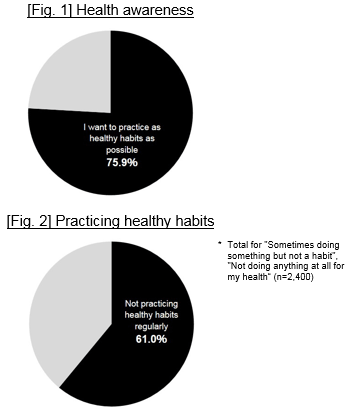 |
| The reason busy people are not able to practice healthy habits is due to a lack of time. |
We asked respondents who expressed a desire to practice healthy habits but weren't able to do so their reasons why. The top responses were, "being weak-willed," "not having enough time," and "costing too much money". In particular, there is a trend of busier workers not practicing healthy habits because they don't have enough time (Fig. 3).
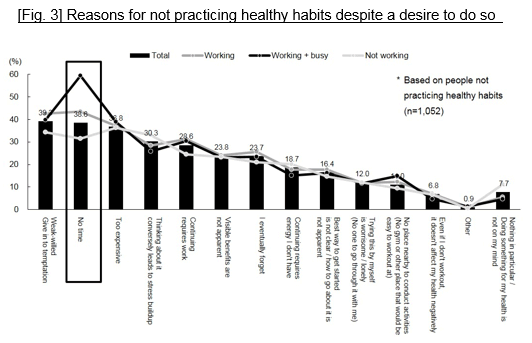 |
| The health dilemma facing busy people is with sleep, food, and exercise. |
Comparing busy workers with non-workers, in terms of healthy habits that people want to practice but have not been able to, the top categories with the biggest differences are sleep, food, and exercise (Fig. 4).
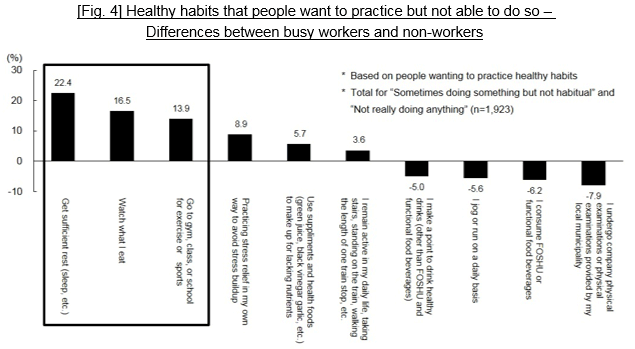 |
III. Consumer awareness survey on health and beverages
(2) FOSHU beverages functioning as a healthy habit booster
Approximately 70% of people drink some form of FOSHU beverages for health reasons. Major keywords include "convenient," "tasty," and "easy to continue" as drinking beverages for health reasons is becoming more common.
As consumption increases, FOSHU beverages are motivating consumers to start healthy habits related to nutrition and exercise, thus serving the role of a healthy habit booster.
Approximately 80% of FOSHU beverage consumers believe it important to combine the consumption of FOSHU beverages with exercise and other healthy habits. In fact, the number of consumers conducting healthy habits was up by more than 10pts.
| Approximately 70% of people drink some kind of beverages for health reasons. |
69.8% of people drink some kind of beverages for health reasons (Fig. 5).
Drinking beverages for health reasons is becoming more common.
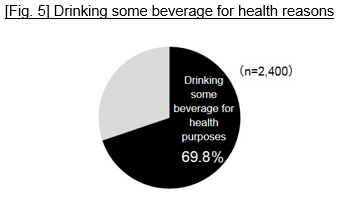 |
| Keywords include "convenient," "tasty," and "easy to continue". |
Top reasons for drinking some kind of beverages for health reasons included "easy to continue (56.9%)," "able to act for my health while drinking my normal beverage (33.0%)," "tasty and easy to continue (29.2%)," and "easy to continue even if busy (27.9%)" (Fig. 6).
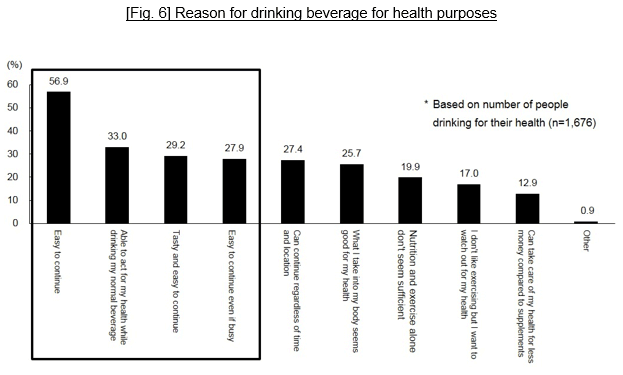 |
| Awareness and behavior changing with approximately 90% of consumers beginning to consume FOSHU beverages. In addition to health awareness, consumer habits are making healthy changes to exercise and food habits. |
Among people drinking FOSHU beverages, approximately 90% of respondents commented that starting to consume FOSHU beverages resulted in a change in health awareness and habits (Fig. 7).
Regarding the details of their change in awareness and habits, the top responses regarding actual changes in habit include "health awareness" as the top response (24.3%) followed by "exercise (18.4%),” and "food (17.1%)" (Fig. 8).
This demonstrates that drinking FOSHU beverages leads to increased health awareness and we are seeing FOSHU beverages functioning as a healthy habit booster leading to a trend of consumers adopting improved habits related to exercise and food.
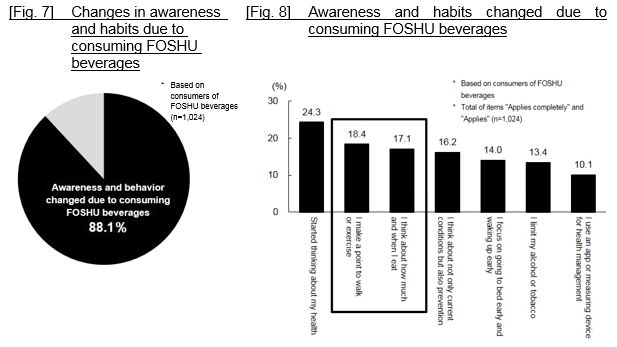 |
| People who consume FOSHU beverages for health reasons are adopting exercise and other healthy habits. |
People who consume FOSHU beverages for health reasons had a higher rate of practicing other healthy habits compared to the general market, including people who don't drink FOSHU beverages (Fig. 9).
Also, among people who normally drink FOSHU beverages habitually, approximately 80% (79.4%) think that combining consumption with exercise and other healthy habits is important (Fig. 10). This shows that FOSHU beverage users focus on and adopt exercise and other healthy habits.
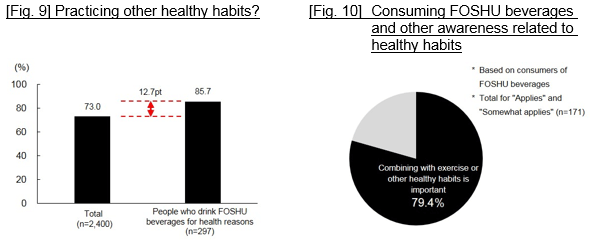 |
III. Consumer awareness survey on health and beverages
(3) FOSHU beverages growing in popularity among younger generations. Consumed by half of males in their 20s and 30s
The FOSHU beverage rate of consumption increased by 6.6pts since the previous survey (2016) to 42.7%. Looking at consumers by gender and age, the rate of consumption among both males and females in their 20s and 30s increased significantly. Over half of males in their 20s and 30s are consuming FOSHU beverages. Consumption among female consumers also increased to above 40%. FOSHU beverages are also growing in popularity among younger generations in their 20s and 30s, suggesting that the potential for the FOSHU beverages market is growing.
| Potential for the FOSHU beverages market is growing. In particular, the rate of consumption among males in their 20s to 30s was more than half. |
The overall FOSHU beverage rate of consumption increased by 6.6pts from the 36.1% of the previous survey (2016) to 42.7% (Fig. 11).
Looking at consumers by gender and age, the rate of consumption among both males and females in their 20s and 30s increased significantly. More than half of males, 51.4%, as well as more than 40% of females, 44.5% of females in their 20s and 42.9% of females in their 30s consume FOSHU beverages. These consumption rates were higher than other generations older than consumers in their 40s. FOSHU beverages are also growing in popularity among younger generations in their 20s and 30s, suggesting that the potential for the FOSHU beverages market is growing.
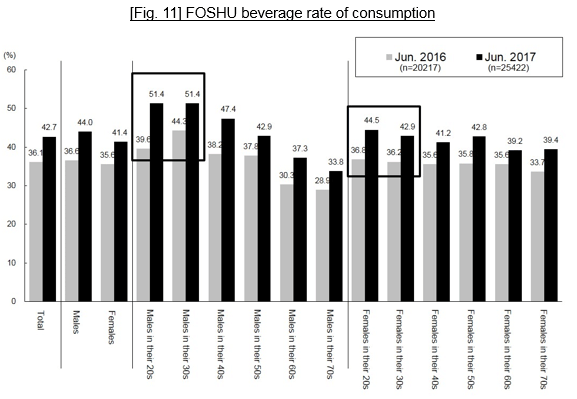 |
III. Consumer awareness survey on health and beverages
(4) Morning FOSHU functioning as health maintenance beverage for workers
Working people focus on productivity in the morning. Among working people, approximately 60% drink FOSHU beverages in the morning. We are seeing a new consumption trend of busy working people consuming FOSHU beverages in the morning to practice efficient health maintenance.
People consuming FOSHU beverages in the morning are more likely to make a habit of consuming FOSHU beverages. The percentage of people practicing other healthy habits was 7.2pt higher at 80.9%.
| People who strive to be active in the morning in order to ensure daily productivity was approximately 60% and approximately 40% adopt exercise. |
More than half (54.8%) responded that morning was the timeframe that most impacted daily productivity (Fig. 12).
Including work, exercise, etc., the number of people who aim to be active in the morning was nearly 60% (58.5%) of all respondents (Fig. 13).
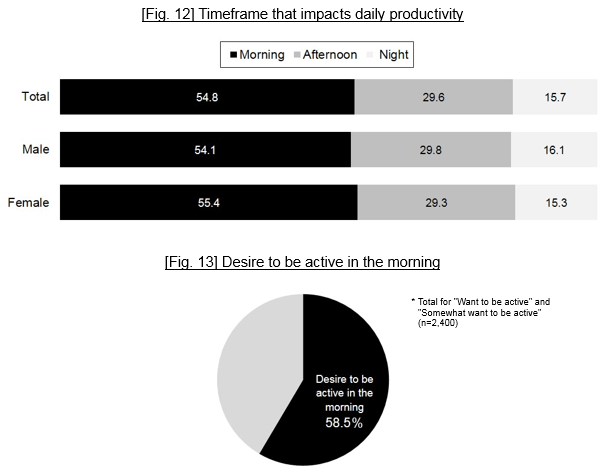 |
| Busier people are more likely to consume FOSHU beverages. Using as a healthy habit that is easy to continue. |
The FOSHU beverage rate of consumption was higher among working people, particularly among people feeling themselves to be busy (Fig. 14).
In addition to "diet" and other items as a motivation for consumption, busy working people in particular were more likely to respond, "I want to maintain my health in a convenient way with a beverage I normally drink." and "I want to start healthy habits with a convenient beverage" (Fig. 15).
This indicates that busier people are choosing FOSHU beverages as a convenient way to improve their daily health.
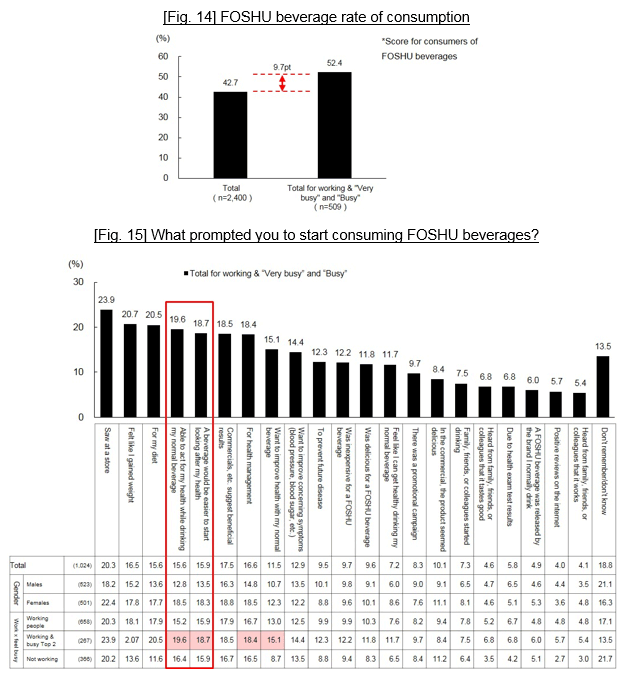 |
| Approximately 90% of people focus on work efficiency. Some 70% of people also want to take an efficient approach to improving their health. |
Among working people, approximately 90% of people focus most on matters related to efficiency such as "progressing with efficiency," "increasing efficiency," and "producing results in a short period of time" (Fig. 16).
Some 70% of people also want to take an efficient approach to improving their health.
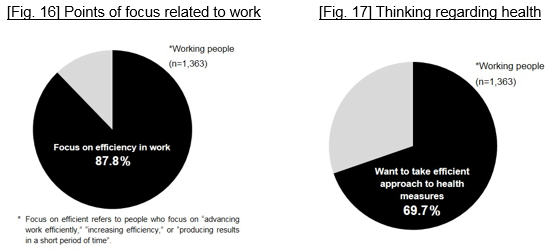 |
| Among working people, approximately 60% drink FOSHU beverages in the morning. The reasons are "forming habits" and "increasing efficiency". |
Among working people, nearly 60% (58.6%) purchase FOSHU beverages in the morning (Fig. 18).
Looking at a comparison of workers and overall respondents, workers were more likely to denote "want to make a habit of drinking FOSHU beverages in the morning" and "want to take care of my health efficiently" as reasons for consuming FOSHU beverages in the morning (Fig. 19).
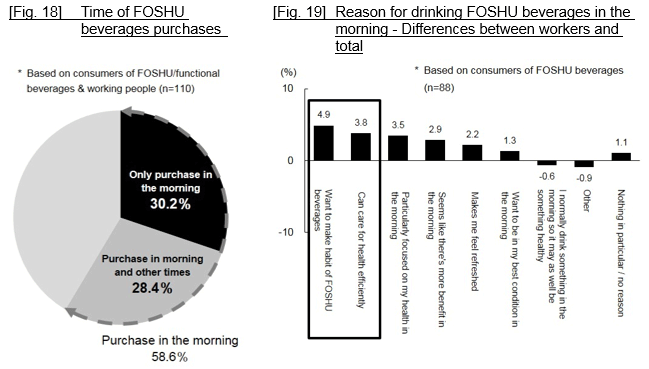 |
| Among working people, those who drink FOSHU beverages in the morning were more likely to adopt the habit of drinking FOSHU beverages. |
This comparison indicates that people who consume FOSHU beverages in the morning are more likely to continue consuming FOSHU beverages. Compared to overall FOSHU beverage drinkers, the likelihood of continued consumption for 3 months or longer and 1 year or longer were approximately 15 points higher and 13 points higher, respectively, among people who drink FOSHU beverages in the morning (Fig. 20).
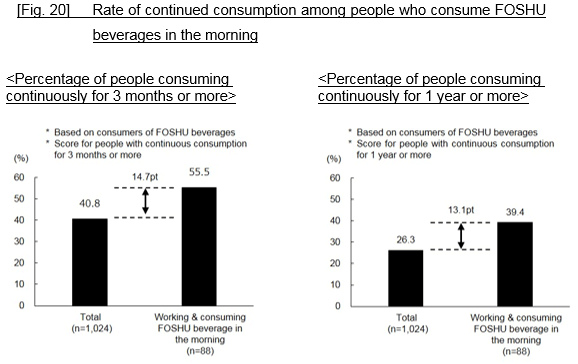 |
| People who consume FOSHU beverages in the morning also have higher rates of nutrition, exercise, and other healthy habits. |
Working people who consume FOSHU beverages in the morning also were more likely to practice other healthy habits beyond the consumption of FOSHU beverages at 80.9%, which was 7.2pts higher than the overall average (73.7%). Looking at each response item, this response group trended at a higher percentage in almost all categories, including nutrition and exercise (Fig. 21).
People consuming FOSHU beverages in the morning have made a habit of consuming FOSHU beverages and are more likely to adopt and maintain other healthy habits (Fig. 22).
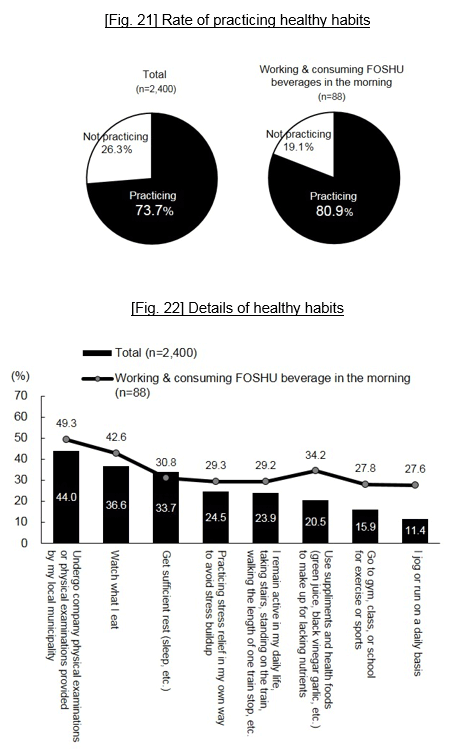 |
IV. Conclusion
The human body is comprised of approximately 60% water*1 and humans cannot live without water.
Suntory believes that the beverages people casually consume without much thought have a major impact on our health.
Striving to contribute to peoples' health through our work in the beverage sector, the Suntory Group is delivering FOSHU beverages and other beverages to support consumer health.
Since 2014, the Suntory Group has conducted surveys related to correlation between FOSHU beverages and people. This year, we continued our work with the "Consumer awareness survey on health and beverages".
From this year’s survey results, we have learned the habit of consuming FOSHU beverages is motivating consumers to reevaluate their nutrition, exercise, and other lifestyle habits and overall make changes for their own health.
Based on our mission as a beverage company, Suntory strives to continue to pursue and research health value related to our natural water resources to contribute to resolving Japan's health problems in terms of both taste and health.
*1 Source: Water for Health Promotion Committee (supported by: MHLW) materials
(URL: http://www.mhlw.go.jp/file/06-Seisakujouhou-10900000-Kenkoukyoku/0000087038.pdf [Japanese only])
[Reference information]
(1) Expected benefits of functional foods
| "Functional beverages consumers would purchase if available" are "body fat", "visceral fat", "diet", and other products related to body fat are most popular |
We asked FOSHU beverage consumers which functional beverages they would like to purchase if available. The most popular responses were "body fat", "visceral fat", "diet", and other products related to body fat. These were followed by products related to "fatigue" and "immune system” (Fig. 23).
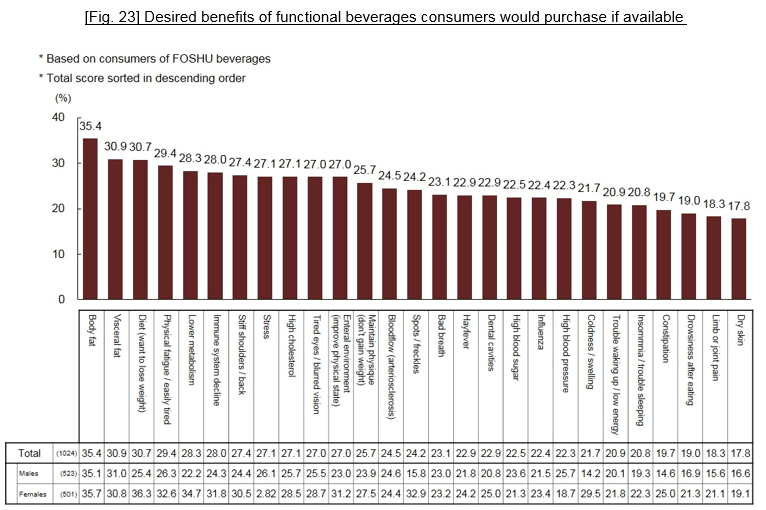 |
[Reference information]
(2) Symptoms that create worry about the future
| The two major diseases that create worry about the future are cancer and dementia. Consumers are concerned about the diverse illnesses associated with obesity and high blood pressure. |
Among diseases that create worry about the future, cancer was the top response followed by dementia and high blood pressure (Fig. 24). In particular with cancer and dementia, there was a gap between wanting to act towards prevention and actually acting towards prevention.
Also, more than 30% of respondents were concerned about diseases that are linked to obesity, including high blood pressure, arteriosclerosis, strokes, and diabetes. Following up cancer and dementia, which greatly impact lifestyle and quality of life (QOL), there are also great concerns about lifestyle diseases.
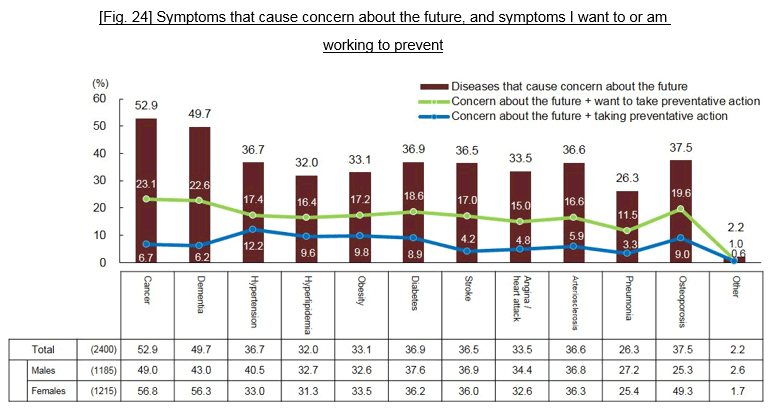 |
